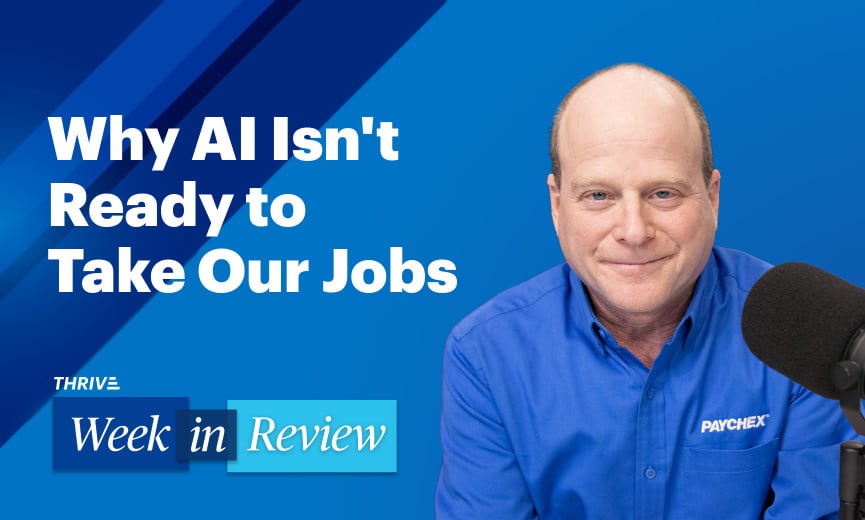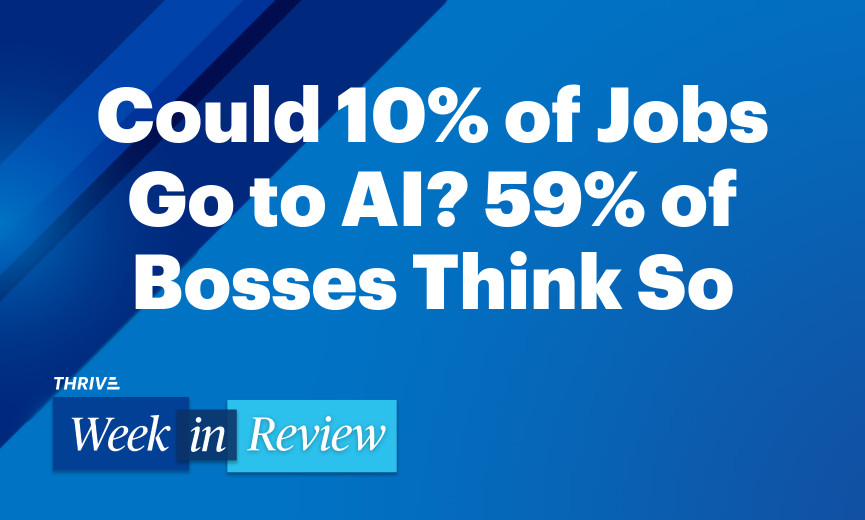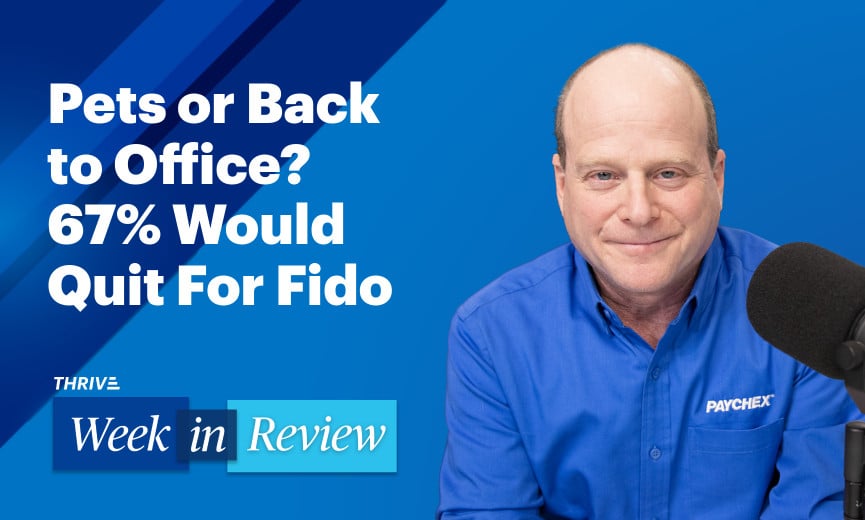- Thrive
-
Temporada
4Episodio138
Superdesplazamientos, estafas con devoluciones de de impuestos y rescates, y el beneficio de los medicamentos que ayudan a bajar de peso

Podcast •

Resumen
In addition to coverage for weight-loss drugs – an upward trending benefit among workers – some even want the flexibility to be a super-commuter and travel distances of more than 300 miles a day. Gene Marks shares insights on these two potential benefits that could help your business attract and retain employees. Plus, the CPA in Gene also offers tips on how to decrease the chances of becoming a victim to tax refund and ransom scams from bad actors seeking money. Listen to the podcast.
Ver transcripción
[Gene Marks, host]
Hey, everybody, it's Gene Marks, and welcome to another episode of the Paychex Thrive Week in Review podcast. This is the podcast where we take a few items in the news that impacts your business and how it impacts your business. I give you a few thoughts and insights – basically, my opinions – okay?
Hey, before we get started, please don't forget: If you go to paychex.com/thrive, you can sign up for our newsletter. There you'll get insights and advice and tips and help for running your business, including links to our other podcast episodes, as well. So, please join us there.
Anyway, let's get to the news, shall we? So, let's see what I've got exciting this week. First of all, the first story that I want to talk to you about is from techtarget.com. It's all about super-commuting. Do you know what super-commuting is? Super-commuting is where you have employees that commute over long distances of – long distances – to get to your office.
I live in Philadelphia. Believe it or not, there are a fair share of people that I have known over the years who have commuted 100 miles into New York City. The reason being that real estate and rents are much cheaper in Philadelphia than they are in New York, and they made a financial case for doing it that way.
Well, as remote computing as increased and work from home and obviously cloud computing has enabled so many people to work remotely, there is a growing number of employees that are now reporting that are actually doing super-commuting. Now, I'm looking at this report right now that says that in 1990 the U.S. Census Bureau said that 1.5% of Americans had a commute of over 90 minutes or more, and that doubled to 3.1% by 2019. There's no specific numbers available recently. I'm sure they're looking into it, but you can imagine that it is It's become a big thing.
So, what do you do if you want to have an employee – or an employee chooses the super commute? How can you as an employer manage it, as well? The article at Tech Target gives some ideas: offering flexible work arrangements, providing potential financial assistance, establishing support groups, offering training and other development programs, and also creating a culture of understanding or support.
I mean, look, if you've got a really great employee with good talent who wants to be super-commuting, if you do some of these things, you might be able to help them accomplish this. They get their work done. They're happier. You're happier because that work is getting done. All is good.
The next piece of news actually comes from two places. It has to do with scams that are impacting your business and potentially mine. The first is an article from axios.com, which is reporting a significant rise in scams on tax returns that both businesses and individuals are filing this year. According to Axios, scammers gather information about you like pictures, addresses, employment status, other personal data that's either publicly posted or available in legal or illegal places, and then what they do? They file a tax return before you file your real one, and then they claim any type of refunds on that tax return and have it then directed to their accounts, you know? So, because they're able to do this faster, they're ahead of the rest of us who kind of delay these things.
So, what do you do to protect yourself against this? Well, according to the IRS, they're like, file your tax returns faster and that way you can get ahead of the scammers. So, that's one big scam trend that's going on just this year.
There's other scams that you should be aware of. There was an interesting article in khon2.com. It is a Hawaii news station, but it's really nationally based. This isn't just, you know, a local thing to Hawaii. But what they're reporting on is that now scammers can get a hold of a bunch of public information about our businesses that are available because of like Paycheck Protection loan filings that we did and maybe other COVID assistance that we received. Well, a lot of this information about ourselves, our businesses are out there, and what this report says is that scammers are getting that information and then calling business owners and threatening them.
They say scammers contact businesses, use all the information to impersonate government agencies, claim to have an active arrest warrant related to the investigation of a company's Paycheck Protection loan, for example, and then they require bond payments or payments to resolve the warrant and avoid jail time. So, scammers are getting that public information and then going after us and threatening us. It is it is definitely a concern.
How do you fight against something like this? I mean, use your common sense. You're getting a call from somebody who's making these kinds of claims, call them back. I mean, that's the best thing you can do. Don't just take no for an answer. Call them back. Certainly, don't pay any attention when you're getting it from an email because government authorities, the IRS, they don't do this kind of stuff by email.
And if you really think that there might be some legitimacy to it, you want to ask to meet face to face, and you better be going to a government office where that meeting is to take place. So, before you hand over any money or make any payments or anything like that, you need to make sure that you are fully investigating who the person is that's making the claim on you. Very important thing to do.
Finally, I have a report from the Philadelphia Business Journal, of all places, about employee benefits. And do you know what is the hottest, most requested benefit this year? It's going to surprise you. They're sending a survey of over 1,300 Americans by diet diabetes care firm called 9 a.m. Health. And besides, of course, health care and retirement plans and flexible coverage or whatever, this report says that the weight loss drugs such as Ozempic® and Wegovy® ranked behind only behind employee health care, flexible working hours, and company equity and 401(k) contributions. It came in ahead of unlimited PTO, work from home or hybrid work, and child-care assistance. Can you believe?
So, now in 2020, for a big new benefit that that employees are asking has to do with these weight-loss drugs. About 30% of the survey respondents said they were employed somewhere that covered the weight-loss drugs. But for those you said they were not, 21% of them said they would very likely change their jobs if they could access, get coverage of these drugs.
Among respondents who were taking the drugs, about 67% of them said coverage was either an extremely important or very important consideration for staying at their current job. Another 23% said it was somewhat important consideration.
So, bear that in mind, guys, if you're looking to provide a good, competitive employee benefit this year, you want to make sure you keep weight-loss drugs in mind. That seems to be a very hot topic.
Those are just some of the news that's impacting your small business and my business this week. My name is Gene Marks. I'm so glad that you watched and listened.
By the way, again, if you like any advice or tips or help sign up for a great Thrive newsletter. It's paychex.com/thrive. You can get great information to help you run your business. Thanks for watching or listening. We'll see you again next week.
This podcast is property of Paychex, Inc. 2024. All rights reserved.

 Apple Podcast
Apple Podcast Spotify
Spotify iHeartRadio
iHeartRadio








